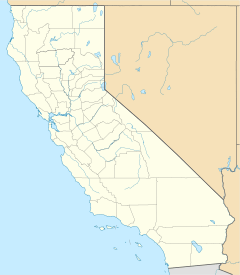Ludlow, California facts for kids
Quick facts for kids
Ludlow
|
|
|---|---|
| Country | United States |
| State | California |
| County | San Bernardino |
| Founded | 1882 |
| Elevation | 1,778 ft (542 m) |
| Population
(2000)
|
|
| • Total | 10 |
| Time zone | UTC-8 (Pacific (PST)) |
| • Summer (DST) | UTC-7 (PDT) |
| ZIP codes |
92338
|
| Area code(s) | 760 |
| GNIS feature ID | 245290 |
Ludlow is a small, quiet place in the Mojave Desert in California, USA. It's not a big city or town with its own government. You can find it along Interstate 40. Parts of the old town, which is almost like a ghost town now, are still visible along the famous Route 66.
Contents
History of Ludlow
How Ludlow Started
The area where Ludlow is located has been settled since the 1870s. The community got its name from William Ludlow, who worked for the Southern Pacific Railroad.
In 1882, the town of Ludlow was officially founded. It began as a "water stop" for the Atlantic and Pacific Railroad. This meant trains would stop there to refill their water tanks.
Soon, people discovered valuable ore in the nearby hills. This discovery caused the town to grow quickly, a time often called a "boom."
Railroads and Mining
From 1906 to 1940, Ludlow was an important connection point for trains. It was the southern "railhead" for the Tonopah and Tidewater Railroad. This railway was used by the Pacific Coast Borax Company.
They used it to transport borax and other mined materials. These products came from places like Death Valley and Beatty, Nevada. From Ludlow, these goods could then be moved onto the larger Santa Fe Railway lines.
Ludlow also served as the northern end for another railway. This was the Ludlow and Southern Railway. It was a mining line that went south to the Bagdad-Chase gold mine. It also reached the mining camp of Rochester. This railway operated from 1903 to 1931.
Route 66 Era
By the 1940s, the mining and railway activities in Ludlow slowed down. The town then found a new way to survive. It started serving travelers on the National Old Trails Road. This road later became the legendary Route 66.
Ludlow offered services like a "Motor Court" with small cabins. There was also the Ludlow Cafe, a gas station, and shady spots. These businesses helped travelers until the late 1960s.
When Interstate 40 was built, it bypassed Ludlow. This meant fewer travelers passed through the town. Most residents left, and many buildings became ruins. Today, tourists exploring historic Route 66 still pass through this quiet ghost town.
Chinese Family History
A Chinese family, the Yims, once lived in Ludlow. Lee Yim, his wife Guishee Yim, and their five children made their home there. They owned and ran The Desert Inn Cafe and Hotel. The Yim family lived in Ludlow from 1914 until the 1960s.
In 1917, a mining site called the Lee Yim Deposit began. It was near Ludlow and started producing minerals in 1918. This mine was part of the Lavic Mining District. Today, the mine is closed. It is now part of the Kelso Dunes Wilderness area.
Geography and Climate
Location of Ludlow
Ludlow is in the Mojave Desert. To the northwest along Interstate 40, you'll find Newberry Springs and Barstow, California.
To the east on Route 66, there's Amboy, the Amboy Crater, and Essex. Further east on Interstate 40 are Needles, California and the Colorado River.
Nearby Natural Areas
The Mojave National Preserve is northeast of Ludlow. This preserve includes the famous Kelso Dunes. These areas are managed by the National Park Service.
To the west of Ludlow is Pisgah Crater. This crater is part of the Lavic Lake volcanic field. South of the town are the Bullion Mountains. The Bristol Mountains are to the east, and the Cady Mountains are to the northwest.
Ludlow uses the ZIP Code 92338. The telephone area codes 442 and 760 serve the community.
Ludlow's Climate
Ludlow has a desert climate. This type of climate is known as "Bwh" on climate maps. It means the area gets a lot of sunshine all year round. This is because of stable air and high pressure.
Landmarks of Ludlow
Here are some important places in Ludlow, including buildings that no longer exist:
- The Desert Inn Cafe and Hotel - This building was on Main Street. It faced the railroad tracks. Lee Yim and his family owned and operated this restaurant and hotel.
- Ludlow Cafe - This was a simple, box-shaped building. It served as a cafe in the 1940s. It was built using wood salvaged from the Tonopah & Tidewater Railroad. In the 1960s, Earl and Lillian Warnix sold it. Laurel and Cameron Friend then owned it. The building survived two fires. By 2015, however, it had been reduced to rubble.
- Ludlow Cemetery - This is an old cemetery. It is where pioneers, or early settlers, were buried.
Ludlow in Media
In 2015, Ludlow was one of the places where the film Sky was shot. Other filming locations included Barstow, Bombay Beach, Hinkley, Joshua Tree, Landers, Lenwood, Newberry Springs, and Victorville, California.
 | Jewel Prestage |
 | Ella Baker |
 | Fannie Lou Hamer |



